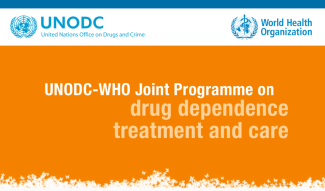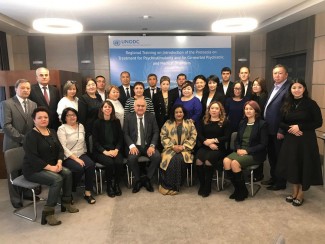Applying interventions designed to reduce and manage the symptoms of substance use disorders.
Treatment
Helping to Support and Transform the Lives of People Affected by Alcohol

UNODC-WHO Joint Programme on Drug Dependence Treatment and Care

Responding to Global Stimulant Use: Challenges and Opportunities
Viet Nam - UNODC Discussing Cooperation in Drug Prevention and Treatment

Six Days Training Workshop of UTC 5 & 8 for Addiction Professionals of Pakistan Organized by M A Jinnah Foundation, Nishan Rehab & ISSUP Pakistan
Cannabis and Adolescence: From Science to Clinical Practice
Join the Department of Public Health & Primary Care for an open lecture "Cannabis and Adolescence: From Science to Clinical Practice" at Trinity College Institute of Population Health, Tallaght. The lecture will include perspectives from neuroscience and clinical practice.
Speakers include:
Dr. Hugh Garavan, PhD- Professor in the Department of Psychiatry at the University of Vermont.
2nd Global Conference on Addiction Medicine, Behavioral Health and Psychiatry
The 2nd Edition of Global Conference on Addiction Medicine, Behavioural health and Psychiatry” will be held on October 22-24, 2020 at Orlando, USA.
The theme of the event is “Unifying the new discoveries and advanced approaches towards Addiction and Psychiatry.”

Treatment for Psychostimulants and for Co-Morbid Psychiatric and Medical Disorders Are Discussed by Experts from the Central Asian States

Vietnamese Policymakers Attend UNODC Training on the Nature, Prevention and Treatment of Drug Use Disorders

iCAAD 2020
iCADD is hosting the largest European conference on addiction, behaviour, and emotional wellbeing.
Join iCADD for 3 days of networking, furthering global connection, communication and understanding in the prevention and treatment of Behavioral, Mental and Emotional Health, facilitated by world-renowned speakers on our uniquely eclectic combination of topics.
